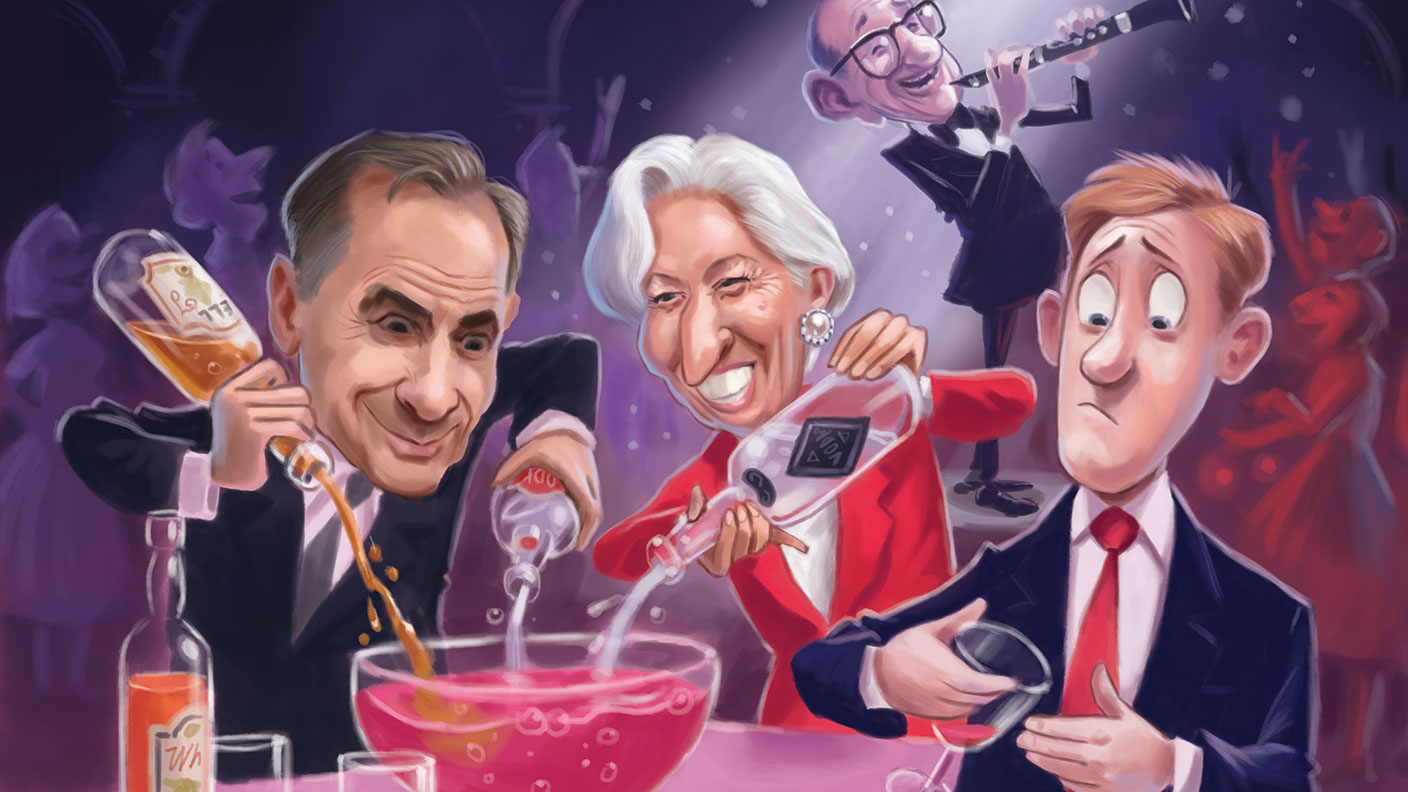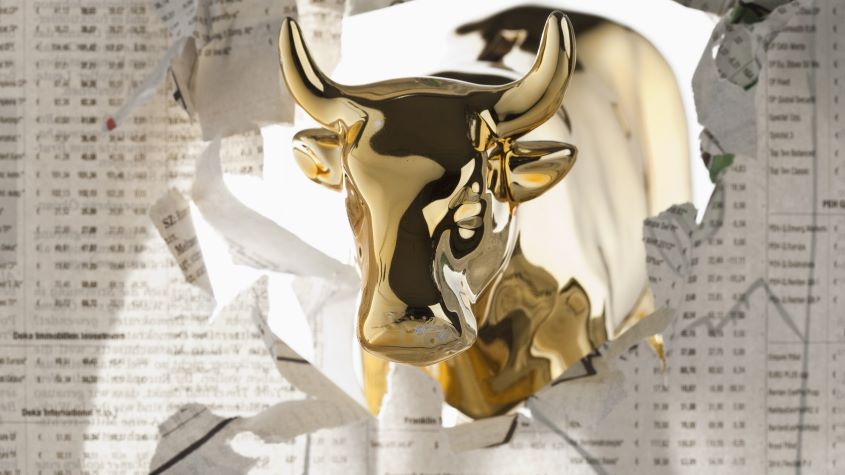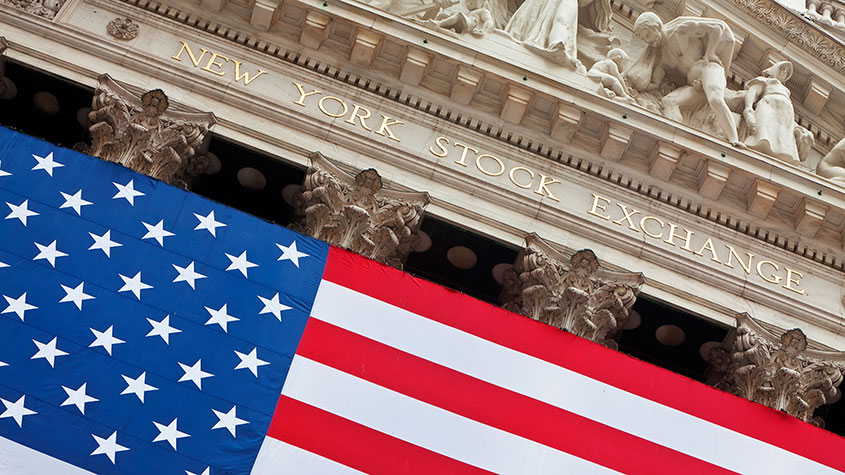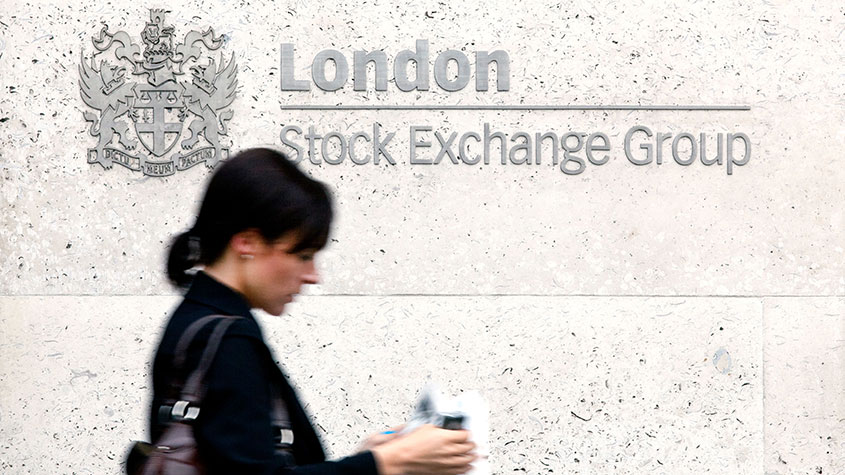Curiouser and curiouser: 20 years in the markets
Central banks have been interfering with market and economic cycles for two decades, undermining capitalism and storing up huge trouble for the future, says Andrew Van Sickle.


Get the latest financial news, insights and expert analysis from our award-winning MoneyWeek team, to help you understand what really matters when it comes to your finances.
You are now subscribed
Your newsletter sign-up was successful
Want to add more newsletters?

Twice daily
MoneyWeek
Get the latest financial news, insights and expert analysis from our award-winning MoneyWeek team, to help you understand what really matters when it comes to your finances.

Four times a week
Look After My Bills
Sign up to our free money-saving newsletter, filled with the latest news and expert advice to help you find the best tips and deals for managing your bills. Start saving today!
People often joke that the past is a foreign country. When it comes to financial markets, it seems more like another universe. So many extraordinary things have happened since we launched the magazine in November 2000 that, if I went back in time and tried to explain it all to my younger self, he would suggest I go and lie down in a dark room. First and foremost, we actually had interest rates in 2000. The Bank of England’s base rate was 6%. The European Central bank’s (ECB) was 4.75%. We analysed the euro’s enduring slump against the US dollar in a section called Euroviews. Along with Dotcom Disaster of the Week, it was my favourite part of the magazine.
In stockmarkets, air was hissing gently out of the dotcom bubble. Analysts spoiled by the longest bull market on record – valuations in the US, which sets the tone for world markets, rose steadily between 1982 and the March 2000 peak – were more bullishly bullish than ever, refusing to believe that stocks would suffer anything other than a mild correction. Buy on the dips, they said. It will be fine.
We didn’t think it would be fine, because we read beyond the City and Wall Street’s hype machine. History shows that market cycles, just like economic ones, go in ups and downs, with long periods (typically well over a decade) of valuations rising from very low to very high and back again as investors alternate between exuberance and despair. In 2000, we were due a long-term, or secular, bear market.
MoneyWeek
Subscribe to MoneyWeek today and get your first six magazine issues absolutely FREE

Sign up to Money Morning
Don't miss the latest investment and personal finances news, market analysis, plus money-saving tips with our free twice-daily newsletter
Don't miss the latest investment and personal finances news, market analysis, plus money-saving tips with our free twice-daily newsletter
The economist Joseph Schumpeter talked of “creative destruction”: recessions were necessary correctives to booms, a cleansing and resetting process that paved the way for a healthy upswing. They clear out dead wood and prevent economies from developing longer-term structural problems – by becoming too skewed towards certain sectors, for instance. Secular bull and bear markets showed that markets had Schumpeterian cycles too.
The dead hand of the state
But what happens if they aren’t allowed to complete them? That is the recurring theme of the past two decades. Central banks have waded into markets to such an extent that downturns have been artificially tempered or repeatedly postponed. This has caused all sorts of new problems in markets and economies that could ultimately land us in far bigger trouble in future than if we had let markets correct naturally.
Returning to the early-2000s bear market, remember what happened after stocks lurched down again in 2002, terrifying the life out of the bullish establishment. In 2003, US Federal Reserve chairman Alan Greenspan slashed rates to just 1%, cementing a pattern he had started to establish in the late 1980s: whenever markets wobbled, he would come to the rescue with cheap money. Stocks duly bounced and the economy ticked up, although we were among those pointing out that the upswing was unusually sluggish. The US labour market, for instance, took far longer to recover its losses than after previous recessions. But central bank action put a floor under stocks, propelling them upwards despite a lacklustre economic backdrop. All the cheap money encouraged rampant speculation across all asset classes, especially in property derivatives. Enter subprime.
Bubble, bubble, toil and trouble
When that bubble burst, central banks slashed rates to nearly zero and resorted to emergency measures. Until then, quantitative easing (QE), injecting cash into the system by buying bonds with printed money, was a policy that only existed in economic-theory textbooks in the Western world (Japan had dabbled in it a few years before). But suddenly, in the years after the financial crisis, it become part of the standard central-bank toolkit. Britain, America, Japan and the ECB all resorted to it.
It did little for economic growth. If you have just gorged on an eight-course dinner, suddenly getting a free or very cheap meal won’t restore your appetite. Similarly, economies soaked in public or private debt didn’t borrow more just because money was practically free. The Anglo-Saxon economies and the eurozone all recovered from their debt crises extremely slowly and hesitantly. Post-2009, Western economies have essentially been trying to walk up a down escalator with a heavy suitcase.
Freshly created money has to go somewhere, however, and it tends to find its way into asset markets. All the liquidity lifted bonds and equity prices. Government debt, which had been in a bull market since former Fed chairman Paul Volcker squeezed inflation out of the system in 1981, just got more and more expensive, with yields sliding lower and lower and eventually falling below zero. Developed-world equities embarked on another multi-year upswing without having reached the valuation lows associated with long-term bear market bottoms.
The extreme becomes mainstream
By the time global growth appeared to be faltering in 2019, slashing rates and printing money to buy assets weren’t emergency measures anymore; they were standard policies. The Fed, having raised rates in baby steps and soaked up some of the money injected into the system by QE, reversed course. It cut rates three times in 2019, even though the relatively solid data showed no sign of an imminent collapse in growth. The ECB made clear it was frustrated by persistently low inflation and hinted that it might add equities to its QE programme. Japan had been hoovering up anything that wasn’t nailed down with printed money since 2012. It owns 75% of the exchange-traded fund (ETF) market. So nobody there batted an eyelid at the ECB’s extraordinary suggestion.
The trouble with resorting to emergency measures as a matter of routine, however, is that when a real emergency hits, you really need to produce something special. So when Covid-19 arrived, central banks threw the kitchen sink at it. The Bank of England’s latest QE programme is literally QE on speed: in the past few weeks it has been buying bonds at twice the rate seen during the financial crisis, says Capital Economics. The Fed is wading into the corporate debt market with its latest blast of QE. It is buying junk bonds. Junk bonds. It is this sort of thing, along with the ECB potentially buying stocks, that would make my younger self’s jaw drop. It would drop further if I told him that several major emerging markets are doing QE now too.
Markets don’t work anymore
Where has all this liquidity got us? The Fed’s balance sheet has soared to over $5.3trn. That’s well over a quarter of the country’s national income. And if you think that’s a lot of printed money, consider that Japan has now bought assets worth more than its GDP. It owns half the government bond market. All this and it has yet to lift inflation significantly. But on it charges: it wants to quadruple its holdings of commercial paper and corporate bonds. Credit-ratings agency Fitch calculates that the central banks of America, Japan, Britain and the eurozone will buy $6trn of assets this year. That’s three times their 2013 haul, which was the previous peak. The Fed, the ECB and the Bank of Japan collectively have balance sheets worth about $18trn. For perspective, global GDP is $86trn.
It’s clear that simply hosing economies with liquidity doesn’t galvanise them into growing faster. But it also has several negative side-effects that boil down to one key problem: it stops markets working properly. This is clearest in the bond market, where QE has seen off the so-called bond vigilantes. Back in the old days, governments would be discouraged from borrowing and spending too heavily because bond markets would sell off their paper, raising yields (implied long-term interest rates) and thus punishing spendthrifts.
But now central banks are underwriting bond markets with QE, profligate governments are off the leash. It doesn’t matter how reckless they are: rates will stay low because bonds are always being hoovered up. Stocks, meanwhile, will always find a floor, even though valuations have never fallen to levels that in the past implied the start of a long-term bull market.
Then there are negative interest rates. Just over $11.4trn of debt worldwide has a negative yield, almost a fifth of the world’s total. Some central banks, notably in Europe, have pushed short-term rates below zero. As far as bonds are concerned, this is encouraging speculation. If you hold a negative-yielding bond to maturity you make a loss, so the only way to profit is to sell it on to someone else and make a capital gain.
More fundamentally, being paid to borrow, and not earning interest on savings, is a distortion of basic economics. Based on the price of money, we choose to borrow and spend because we think we can make a higher return than the cost of money. If money is essentially free, we will be more reckless than usual, storing up future trouble – or perhaps so fearful given this absurd backdrop that we will sit on our hands. Either way, it bodes ill.
Time to panic?
Central banks, then, have landed us with two fundamental problems. Firstly, “markets have lost the capacity to self-adjust and correct”, as Doug Noland of the Credit Bubble Bulletin puts it. And the price of money has lost its meaning. At the macroeconomic level, distortions caused by years of interference have included the rise of zombie companies – unviable businesses that only still exist because interest rates are so low – and economies unhealthily skewed towards the financial sector, as we witnessed in the run-up to the 2008 crisis. “The saving grace of capitalism, its often cruel efficiency, is steadily being lost”, says John Authers on Bloomberg.
World markets are going further and further through the looking glass. Quite how all this monetary dysfunction finally comes to an end is unclear; we suspect it will be through a nasty bout of inflation, and we will explore the issue in depth in future MoneyWeeks. But for now, we find ourselves in the same position as throughout most of the surreal past two decades: cyclically bullish owing to the sheer amount of liquidity sloshing around; structurally bearish because the entire global market edifice is so hideously flawed; and holding on more tightly to our gold than ever before.
Get the latest financial news, insights and expert analysis from our award-winning MoneyWeek team, to help you understand what really matters when it comes to your finances.

-
 How a ‘great view’ from your home can boost its value by 35%
How a ‘great view’ from your home can boost its value by 35%A house that comes with a picturesque backdrop could add tens of thousands of pounds to its asking price – but how does each region compare?
-
 What is a care fees annuity and how much does it cost?
What is a care fees annuity and how much does it cost?How we will be cared for in our later years – and how much we are willing to pay for it – are conversations best had as early as possible. One option to cover the cost is a care fees annuity. We look at the pros and cons.
-
 Is it different this time for Japanese stocks?
Is it different this time for Japanese stocks?Analysis Nikkei 225 Index has jumped 19.8% this year, and there are signs the rally could continue.
-
 As China reopens, why pick an income strategy?
As China reopens, why pick an income strategy?Advertisement Feature Yoojeong Oh, Investment Manager, abrdn Asian Income Fund Limited
-
 Is Japan the best market to invest in now?
Is Japan the best market to invest in now?Opinion Japan puts Western economies to shame and offers good value for both equity and bond investors, says Max King.
-
 The highest yielding S&P 500 Dividend Aristocrats
The highest yielding S&P 500 Dividend AristocratsTips Dividends are a key component of investment returns in the long-term. A portfolio of dividend aristocrats is a great way to build wealth and a sustainable income stream.
-
 2023 will be a bumper year for stocks. Here’s how to play the rally
2023 will be a bumper year for stocks. Here’s how to play the rallyTips Dominic Frisby explains why he thinks the market rally could have further to run in 2023 despite macroeconomic headwinds
-
 China’s post-covid investment boom off to a slow start. Should you still invest in China?
China’s post-covid investment boom off to a slow start. Should you still invest in China?Advice Investors are no longer bullish on the China shop but the gloomy consensus on Beijing’s economy might be unfair. Should you invest in China?
-
 Stock market crash? This time it’s (slightly) different
Stock market crash? This time it’s (slightly) differentOpinion The bears expecting a stock market crash have got it wrong, says Max King.
-
 3 UK shares to buy yielding up to 17%
3 UK shares to buy yielding up to 17%Tips 3 UK shares top stocks to buy now, according to Alex Harvey of Momentum Global Investment Management.